So where’s the surge in inflation expectations, now that the Fed has stopped tightening?
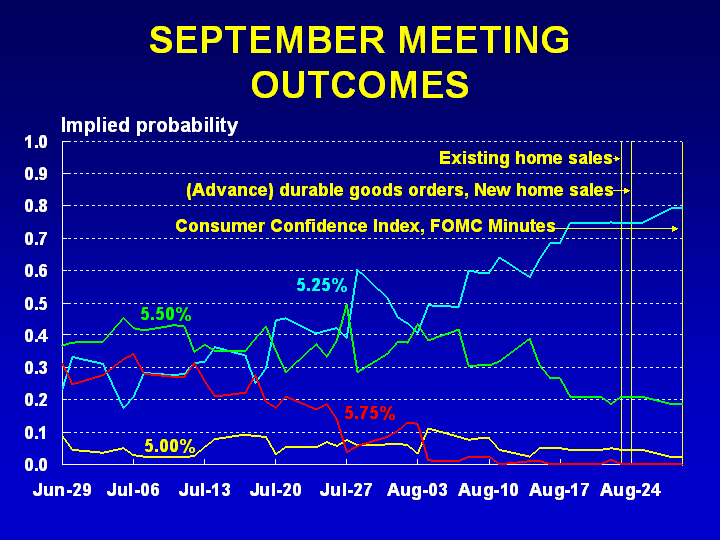
In case you’ve been hiding under a rock, the big financial story of the last month was that the Fed has stopped raising interest rates. The above graph (courtesy of the Federal Reserve Bank of Cleveland) shows the market’s implied probability of different interest rates that the Federal Reserve might choose to set at its coming FOMC meeting in September, as reflected in the prices of fed funds option contracts. Two months ago, everybody was convinced that the big question for the September meeting was whether the Fed would select 5.5% or 5.75% as its target for the interest rates on loans of federal funds. Today, people are pretty confident the Fed will stick to 5.25%, just as the Fed chose in its most recent August meeting.
Many were the pundits who warned that, if the Fed did pause, inflation would come pouring out like water through a broken levee. If you believe that, one good way to insure yourself against inflation risk would be to buy a 10-year Treasury Inflation-Protected Security (TIPS), whose coupon and principal are both indexed to increase one-for-one with the headline CPI. By borrowing at today’s low nominal yields to buy TIPS, you’ll make a profit if inflation turns out to be bigger than the current nominal-TIPS spread. But that spread has been stubbornly stuck at around 2.6%, and if anything has come down since the Fed decided to stop tightening. If you are expecting more than 2.6% annual CPI inflation over the next 10 years, there seem to be plenty of people willing to take the other side of the bet against you.
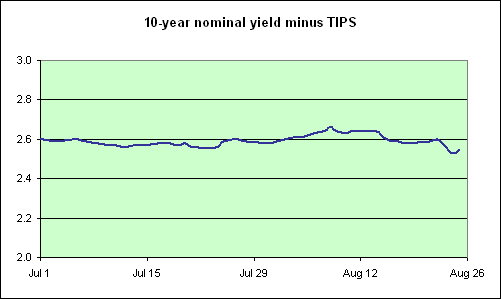 |
Those raising the inflation fears have offered various excuses to dismiss the current low long-term nominal yields and high long-term TIPS yields as some kind of aberration or market misperception, somehow believing that inflation fears instead would show up in commodity prices. That view has always been troubled by the huge differences in price changes across different commodities. That view has been further challenged most recently by the fact that, since the Fed has decided to stop tightening, commodity prices have tumbled. Gold and oil are down,
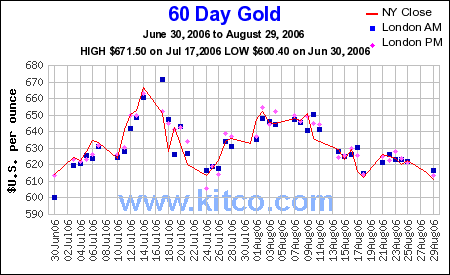 |
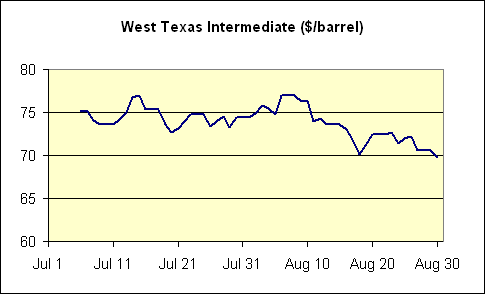
as are copper, zinc, and aluminum (graphs courtesy Kitconet)
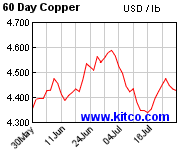
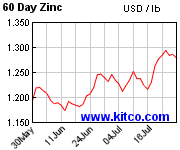
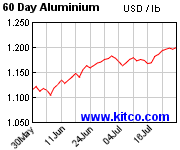
What brought commodity prices and long-term nominal yields down is the same thing that induced the Fed to pause, namely, the recognition that the magnitude of the incipient economic slowdown is more significant than many were anticipating a few months ago. To be sure, many other factors influence the price of any given commodity, and some commodities, such as silver, lead, and nickel, are up rather than down over the last two months. But other things equal, slower growth of real economic activity is bearish for any commodity, and as the reality of the slowdown has sunk in, commodity prices have responded, one by one.
Eventually that reality is also going to sink in with those who have been hollering that the Fed still hasn’t raised interest rates far enough.
Technorati Tags: macroeconomics,
Federal Reserve,
interest rates,
inflation,
commodities,
oil prices
Interesting — I hadn’t seen the latest probabilities.
I have a thought about the “inflation fears in commodity prices” story. It strikes me that if that were the case then one might expect to see it reflected in the behavior of “commodity currencies” like the Aussie or Canadian dollars. A quick eyeball test (courtesy of yahoo finance) doesn’t show much evidence of that, at least not over the past 3 months.
PS
You make a strong case. Still, I fully expect the real (headline) CPI to exceed the present 4.1% over the next several months & I’m a buyer of TIPS. Only wish the index upon which it is based were more accurate.
Are the people currently lending the US gov’t money for 10 years at an interest rate just 0.6% above the current CPI rational? If they are US citizens who must pay tax on that yield, they are in the hole from the get-go.
The 10 yr treasury yileds are in no way market determined. CB purchases in the bond has wildly distorted the yields.
When CBs who are willing to bear interest risk for domestic growth distort the bond market, bond yields get disconnected from inflation expectations.
That entire premise is based on **rational** bond investors who **dont want to bear a loss** and price that risk in. It does not include CBs **willing to trade growth for loss**.
So my question to you is this – why do you still look to the bond market to gauge inflation?
Even Bill Gross does not.
nn, I’ve never understood this argument. If it were true that non-profit-motivated institutions are the biggest players in this market and are buying at irrational prices, that is all the more reason for rational profit-seeking individuals or institutions to step in and reap the free rewards. If the nominal-TIPS spread is wrong, then borrow nominal, use the proceeds to buy TIPS, and you have a machine for creating arbitrarily large wealth out of thin air.
What matters is not the motivations of the average holder of these assets, but rather the incentives for the marginal holder. The marginal holder could be me or you. How can you maintain that the marginal holder is irrational?
I agree with nn. It is ridiculously obvious that the bond market is not behaving rationally when there is not even a 2% premium for short term bonds when the BLS is saying inflation is 5%. You can’t build financing on the core CPI, which is only a policy number and doesn’t represent real-world costs.
I’ve been looking at the bid-to-cover ratio for bond auctions and it is trending down. It seems the government only accepts the bids it likes, and there are fewer and fewer of these lately.
Even this likely doesn’t tell the while story, since rational, independent market agents cannot be separated from the government and its buddies.
So my question to you is this – why do you still look to the bond market to gauge inflation?
Even Bill Gross does not.
Well, he may be SAYING he doesn’t, but if you believe everything he says (I can’t even understand his writings half the time), I hope you didn’t loose too much shorting bonds per his “advise” a couple of years ago.
To the point – investments are not evaluated on the basis of their own merits in isolation, but are measured against other opportunities. If one believes there’s an economic slowdown in store, buying 10-Y note at 4.8% + another 5% of potential appreciation surely beats a going-nowhere stock market.
Small Investor Chronicles
Aaron, You can too build financing on the core CPI because you can hedge your energy price exposure in the futures markets. Right now crude futures are pricing in increases over the next 2 years of about 2% annually (although most of the increase comes in the first two months) — significantly less than core inflation over the past year. So if you expect core to stay at 2.7% and you can hedge energy at 2%, you end up with maybe 2.5%. Even on those terms short-term bonds don’t look bad to me at all. And with the softening economy, I would say 2.7% is on the high end of likely core inflation over the next 2 years.
Aaron, I don’t think your argument about bond market investors behaving irrationally is supported by history. There were some very long periods (think late ’70s) when the real returns to cash and short-term debt were quite negative. Do the data show that foreign central banks were big buyers then, driving yields below inflation? I don’t think so. There are times when investors fail to “require” adequate inflation and real compensation for their money. But, they do earn a lot more than if they were to simply stuff it in the mattress. Is this necessarily irrational?
Dr. JDH,
Excellent post. Even a Econ novice will understand this well.
I have one question though, given that US economy is slowing down and commodities are falling down one by one, why is the USD not falling then ? Do you reckon, its going to happen soon ? (may be after Sep FED meeting)
James,
Good analysis. While I believe that the price of gold is reflecting more the FED pause and the expectation of economic improvement, you are spot on concerning other commodities. There probably will be an increase in CPI numbers in the next few months, but, unless the FED returns to tightening, renewed economic growth should help bring down even the price inflation.
It is good to see someone who does not criticize the FED pause.
If you look at the nominal-TIPS spread, since 28Aug2003 (three years) it has an average of 2.45 with min at 2.00 and max at 2.76. 3-month moving average oscillate around 2.5.
Someone has indeed decided to put a very close range on 10Y inflation expectations.
Dick, there will be no economic improvement. Data on the 3rd quarter at this point shows a flat quarter, which is on the edge of recession. You obviously lost and need some help.
There is a lot of talk on the street to the effect that our de facto fearless leader Dick Cheney has given himself a new time-critical assignment, working with our “good friends” the Saudis, our “favorite institutions” the hedge funds and our “favorite trading partners” the Chinese to engineer a sharp, temporary dive in crude/gasoline futures during the runup to November. Even loose lips John Bolton seems to have moved the zipper into the closed position.
This alone may be having a substantial influence on the metrics being discussed here, among others.
(Oops, forgot to mention that Dick asked 43 to play his part in the plan…..speaking to God about steering those nasty storms out of the gulf.)
For my part, I prefer Charlie Bean’s assessment of inflation. To quote The Independent:
“The Bank of England’s chief economist Charlie Bean has warned that record oil prices could kill off the era of cheap goods, making it harder for policymakers to keep a lid on inflation.”
I’m a bit surprised that JDH didn’t mention Dr. B’s “glut of global savings” argument:
http://www.federalreserve.gov/boarddocs/speeches/2005/200503102/default.htm
Both before, during and after the hubbub over “to pause, or not to pause, is that the question?”, interest rates globally have been mystifyingly low. While there’s something fundamentally uncomfortable about the Glut of Savings (GoS) hypothesis, after six months’ trying I’ve about given up trying to disprove it.
Last, I would note that the decline in interest rates and inflation expectations and commodity prices really began with a huge move back around May 8-10 around the time the Fed Governors went on a jawboning blitz around the countryside. Gold, copper, aluminum, small cap stocks and other liquidity sensitive stuff all declined precipitously right then, and the dollar which had previously been slapped around, bottomed and rallied against other major currencies.
And while I don’t know what exactly money is anymore, as a general observation money suppy growth has also been quite constrained since sometime earlier in this calendar year . . . .
The demise of the housing bubble may be extremely deflationary. As the illusion that one’s home will fund retirement evaporates, the savings rate may return to its normal level — because so many are so far behind in saving, it may go above that level. At the same time, people in hock up to their ears may begin a process of balance sheet repair.
With loan demand so reduced, the money supply expanding function of fractional reserve banking may be disabled. According to Richard Koo’s “Balance Sheet Recession”, these were the causes of deflation in Japan. It can happen here.
>
A recent paper I have seen at a few blogs is Niall Ferguson’s “Political risk and the international bond market between the 1848 revolution and the outbreak of the First World War (Economic History Review, LIX (2006) pp70-112).
It is an interesting paper all-in-all, but one point I think it reinforces is that no group does a consistently good job of prediction even near-term future events.
I don’t think bondholders are any more irrational then anyone else. But their current motivations and forecasting powers could both be brought into question. In a market with so many different players it would be stunning if various groups “rational decision making” did not work at cross purposes.
To speculate large amounts of money on the timing of future inflation/ bond yield increases would certainly be perilous. It is very much the same type of problem as to why the “bears” cannot reign in a (in this case hypothetical) bubble market
The surge in inflationary expectations comes after the Fed remains on hold and inflation, as measured by the Fed’s preferred index–core PCE–continues at around 2.4% on a year-over-year basis. The markets, bond and equity, do not like slow growth, rising inflation environments. The Fed has enough credibilty right now to stand pat and wait for inflation to subside, but if core PCE does not fall to less than 2% fairly soon, that credibility will be spent down quickly. For additional comments, check out http://www.double-coincidence@blogspot.com.
Piso,
Expect the PCE to remain above 2% until at least the end of the year.
what i expect is that when we look back from the vantage point of labor day, 2016 and assess inflation over the preceding decade, it will be higher than 2.6%. so i think the TIPS market is wrong (markets not being infallible and all), but not irrational: i can understand the belief that we are sliding towards recession and that will limit price increases.
i simply don’t share it: we are not seeing any signs of an overheating economy, the normal scenario that higher interest rates curb. What’s driving core inflation as much as anything, for instance, is rent increases, and the anecdotal evidence is that we’re at the beginning of a cycle, not the end. What’s driving headline inflation is energy prices, and that too is not being driven by an overheated economy but by global geo-political factors which, while they could improve, don’t seem all that likely to.
the “soft landing” notion, which assumes that the fed has tightened sufficiently to ease inflationary pressures without plunging us into recession (i realize that our host is not employing that argument) reminds me of nothing so much as the ’60s era of “fine tuning” the economy. that would be right before inflation became a serious problem….
meanwhile, the notion that a recession will cool off pricing pressures, while possible, strikes me as inconsistent with the drivers of inflation readings.
it takes two to make a market, so i could easily be as wrong as i think the TIPS market is, but just because the TIPS market doesn’t today reflect an increased fear of inflation doesn’t mean it won’t at some moment.
I have given up trying to predict inflation, however, I see it as a serious risk. I insure against this risk by buying I-Bonds. These bonds are adjusted for inflation in addition to a fixed rate, can be kept up to 30 years before tax is due (tax-free compounding of interest!), can be sold after 5 years with no interest penalty, and are backed directly by the U.S. government. There is a maximum purchase of $30,000 per year for individuals. They are available here: I-Bonds
In this way, I can be sure that I will have at least the amount of current dollars I invest 30 years from now. This kind of insurance allows me to take other risks with inflation and the economy, and maintain a well-diversified portfolio.
strip away “energy” and “food” to resolve so-called CORE CPI, and it looks a heluva lot like The YankeeDollar Index has become The YuanDollar Index … also illuminating to see the “value” of U.S. Real Estate as measured by GOLD rather than USD/CPI; “soft landing,” indeed :-/
BTW, Happy Labor Day.